Children facing economic adversity
VerifiedAdded on 2023/01/18
|12
|3249
|72
AI Summary
This paper discusses the economic adversities faced by children and their impact on various aspects of their lives. It also explores the implications of poverty on children's physical and mental health, development, and academic achievement. The paper concludes with recommendations for addressing childhood poverty.
Contribute Materials
Your contribution can guide someone’s learning journey. Share your
documents today.
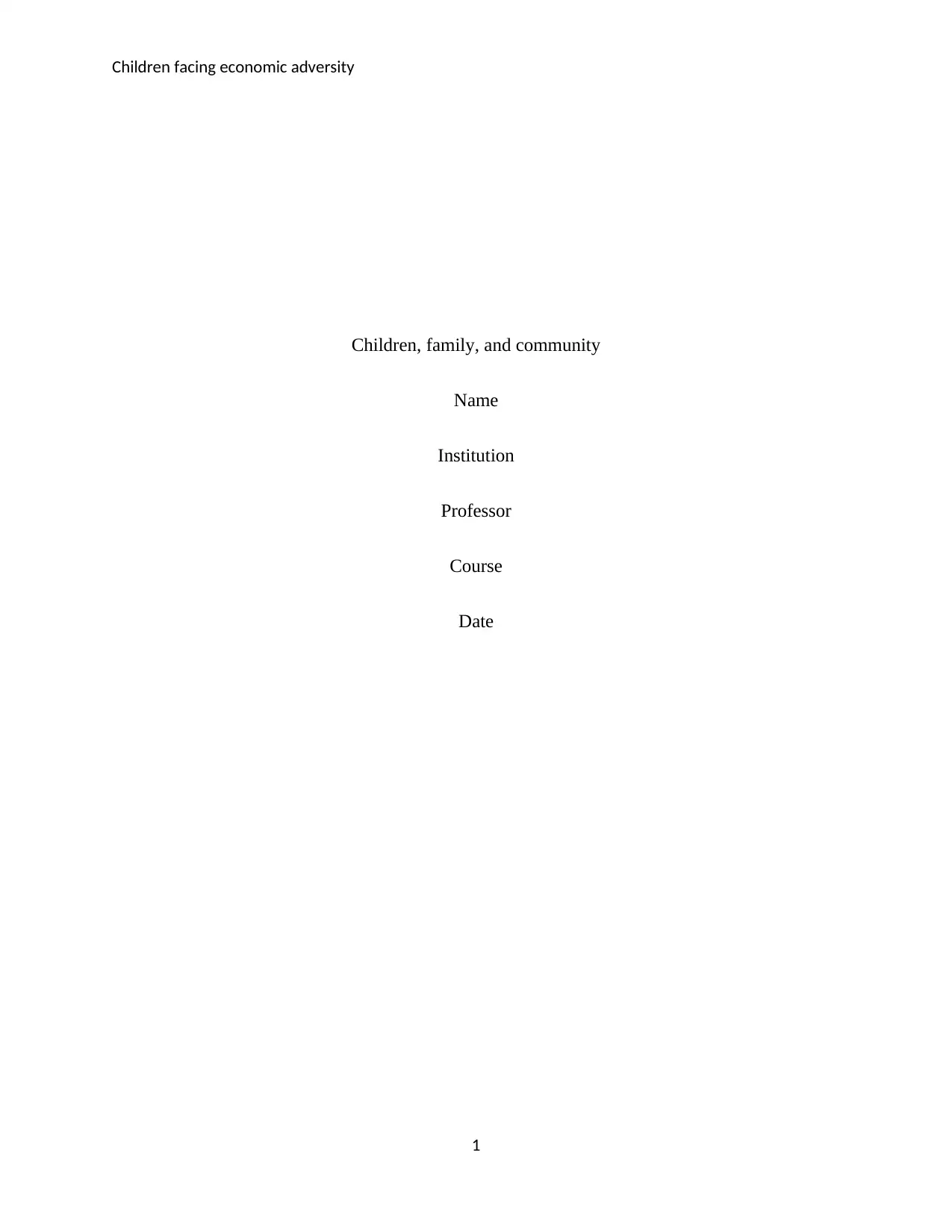
Children facing economic adversity
Children, family, and community
Name
Institution
Professor
Course
Date
1
Children, family, and community
Name
Institution
Professor
Course
Date
1
Secure Best Marks with AI Grader
Need help grading? Try our AI Grader for instant feedback on your assignments.
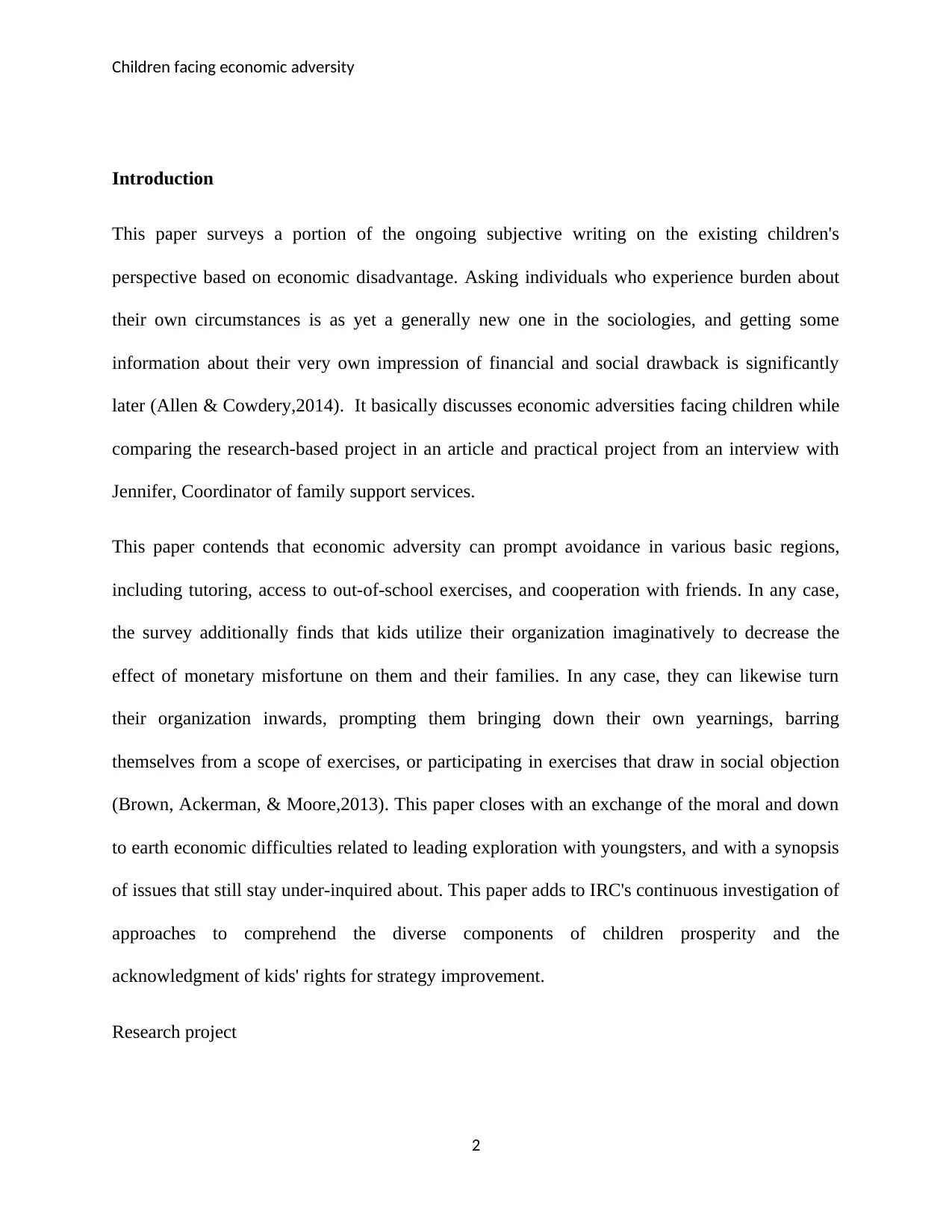
Children facing economic adversity
Introduction
This paper surveys a portion of the ongoing subjective writing on the existing children's
perspective based on economic disadvantage. Asking individuals who experience burden about
their own circumstances is as yet a generally new one in the sociologies, and getting some
information about their very own impression of financial and social drawback is significantly
later (Allen & Cowdery,2014). It basically discusses economic adversities facing children while
comparing the research-based project in an article and practical project from an interview with
Jennifer, Coordinator of family support services.
This paper contends that economic adversity can prompt avoidance in various basic regions,
including tutoring, access to out-of-school exercises, and cooperation with friends. In any case,
the survey additionally finds that kids utilize their organization imaginatively to decrease the
effect of monetary misfortune on them and their families. In any case, they can likewise turn
their organization inwards, prompting them bringing down their own yearnings, barring
themselves from a scope of exercises, or participating in exercises that draw in social objection
(Brown, Ackerman, & Moore,2013). This paper closes with an exchange of the moral and down
to earth economic difficulties related to leading exploration with youngsters, and with a synopsis
of issues that still stay under-inquired about. This paper adds to IRC's continuous investigation of
approaches to comprehend the diverse components of children prosperity and the
acknowledgment of kids' rights for strategy improvement.
Research project
2
Introduction
This paper surveys a portion of the ongoing subjective writing on the existing children's
perspective based on economic disadvantage. Asking individuals who experience burden about
their own circumstances is as yet a generally new one in the sociologies, and getting some
information about their very own impression of financial and social drawback is significantly
later (Allen & Cowdery,2014). It basically discusses economic adversities facing children while
comparing the research-based project in an article and practical project from an interview with
Jennifer, Coordinator of family support services.
This paper contends that economic adversity can prompt avoidance in various basic regions,
including tutoring, access to out-of-school exercises, and cooperation with friends. In any case,
the survey additionally finds that kids utilize their organization imaginatively to decrease the
effect of monetary misfortune on them and their families. In any case, they can likewise turn
their organization inwards, prompting them bringing down their own yearnings, barring
themselves from a scope of exercises, or participating in exercises that draw in social objection
(Brown, Ackerman, & Moore,2013). This paper closes with an exchange of the moral and down
to earth economic difficulties related to leading exploration with youngsters, and with a synopsis
of issues that still stay under-inquired about. This paper adds to IRC's continuous investigation of
approaches to comprehend the diverse components of children prosperity and the
acknowledgment of kids' rights for strategy improvement.
Research project
2
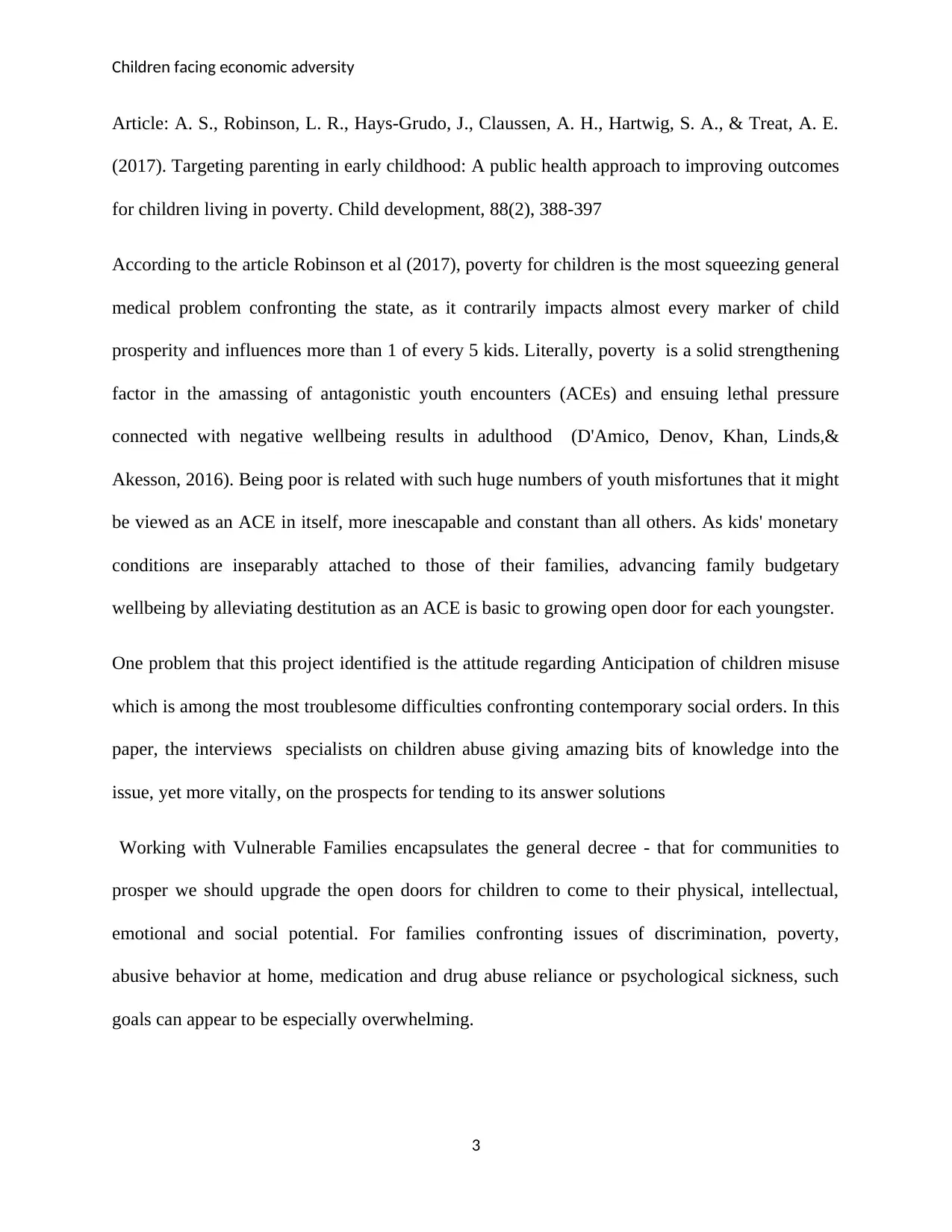
Children facing economic adversity
Article: A. S., Robinson, L. R., Hays‐Grudo, J., Claussen, A. H., Hartwig, S. A., & Treat, A. E.
(2017). Targeting parenting in early childhood: A public health approach to improving outcomes
for children living in poverty. Child development, 88(2), 388-397
According to the article Robinson et al (2017), poverty for children is the most squeezing general
medical problem confronting the state, as it contrarily impacts almost every marker of child
prosperity and influences more than 1 of every 5 kids. Literally, poverty is a solid strengthening
factor in the amassing of antagonistic youth encounters (ACEs) and ensuing lethal pressure
connected with negative wellbeing results in adulthood (D'Amico, Denov, Khan, Linds,&
Akesson, 2016). Being poor is related with such huge numbers of youth misfortunes that it might
be viewed as an ACE in itself, more inescapable and constant than all others. As kids' monetary
conditions are inseparably attached to those of their families, advancing family budgetary
wellbeing by alleviating destitution as an ACE is basic to growing open door for each youngster.
One problem that this project identified is the attitude regarding Anticipation of children misuse
which is among the most troublesome difficulties confronting contemporary social orders. In this
paper, the interviews specialists on children abuse giving amazing bits of knowledge into the
issue, yet more vitally, on the prospects for tending to its answer solutions
Working with Vulnerable Families encapsulates the general decree - that for communities to
prosper we should upgrade the open doors for children to come to their physical, intellectual,
emotional and social potential. For families confronting issues of discrimination, poverty,
abusive behavior at home, medication and drug abuse reliance or psychological sickness, such
goals can appear to be especially overwhelming.
3
Article: A. S., Robinson, L. R., Hays‐Grudo, J., Claussen, A. H., Hartwig, S. A., & Treat, A. E.
(2017). Targeting parenting in early childhood: A public health approach to improving outcomes
for children living in poverty. Child development, 88(2), 388-397
According to the article Robinson et al (2017), poverty for children is the most squeezing general
medical problem confronting the state, as it contrarily impacts almost every marker of child
prosperity and influences more than 1 of every 5 kids. Literally, poverty is a solid strengthening
factor in the amassing of antagonistic youth encounters (ACEs) and ensuing lethal pressure
connected with negative wellbeing results in adulthood (D'Amico, Denov, Khan, Linds,&
Akesson, 2016). Being poor is related with such huge numbers of youth misfortunes that it might
be viewed as an ACE in itself, more inescapable and constant than all others. As kids' monetary
conditions are inseparably attached to those of their families, advancing family budgetary
wellbeing by alleviating destitution as an ACE is basic to growing open door for each youngster.
One problem that this project identified is the attitude regarding Anticipation of children misuse
which is among the most troublesome difficulties confronting contemporary social orders. In this
paper, the interviews specialists on children abuse giving amazing bits of knowledge into the
issue, yet more vitally, on the prospects for tending to its answer solutions
Working with Vulnerable Families encapsulates the general decree - that for communities to
prosper we should upgrade the open doors for children to come to their physical, intellectual,
emotional and social potential. For families confronting issues of discrimination, poverty,
abusive behavior at home, medication and drug abuse reliance or psychological sickness, such
goals can appear to be especially overwhelming.
3
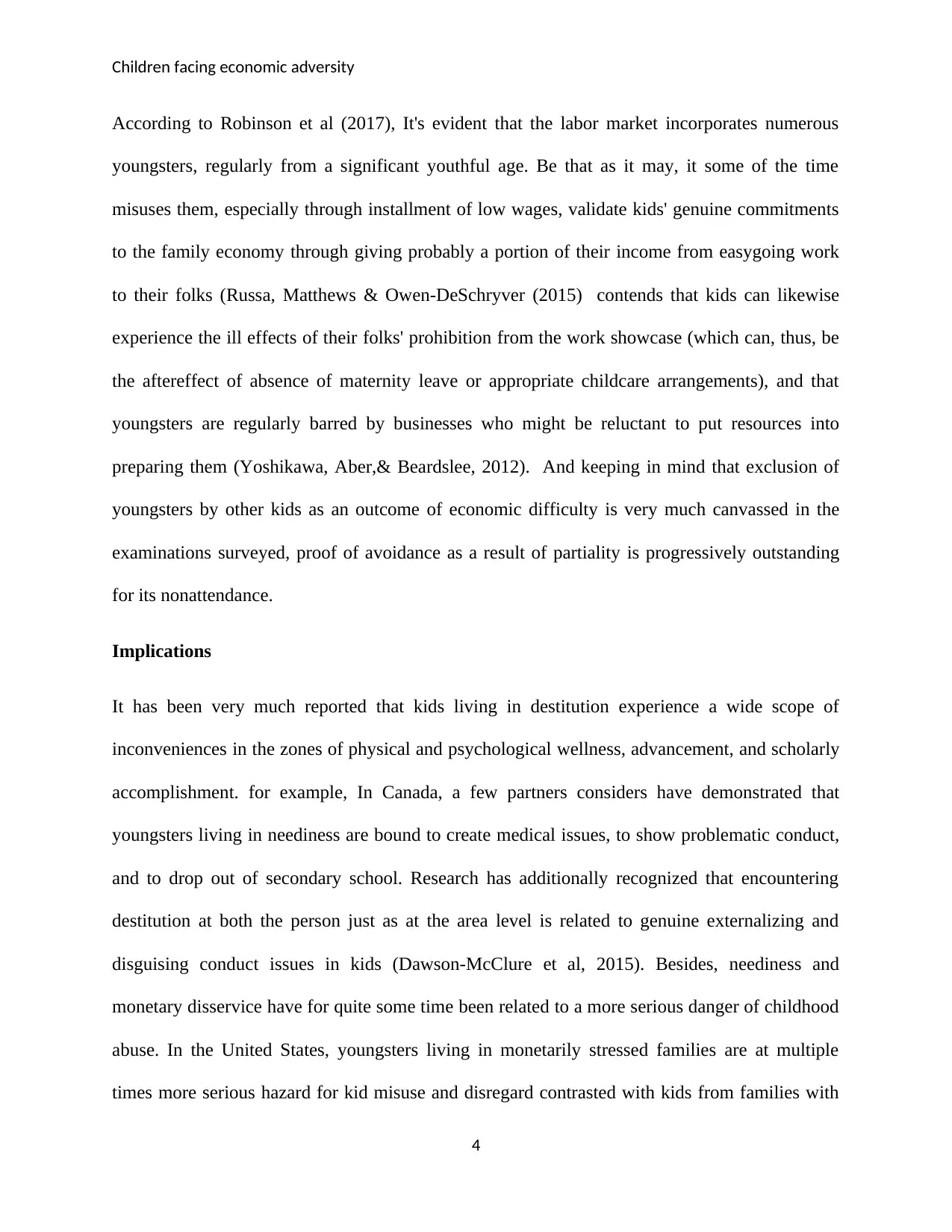
Children facing economic adversity
According to Robinson et al (2017), It's evident that the labor market incorporates numerous
youngsters, regularly from a significant youthful age. Be that as it may, it some of the time
misuses them, especially through installment of low wages, validate kids' genuine commitments
to the family economy through giving probably a portion of their income from easygoing work
to their folks (Russa, Matthews & Owen-DeSchryver (2015) contends that kids can likewise
experience the ill effects of their folks' prohibition from the work showcase (which can, thus, be
the aftereffect of absence of maternity leave or appropriate childcare arrangements), and that
youngsters are regularly barred by businesses who might be reluctant to put resources into
preparing them (Yoshikawa, Aber,& Beardslee, 2012). And keeping in mind that exclusion of
youngsters by other kids as an outcome of economic difficulty is very much canvassed in the
examinations surveyed, proof of avoidance as a result of partiality is progressively outstanding
for its nonattendance.
Implications
It has been very much reported that kids living in destitution experience a wide scope of
inconveniences in the zones of physical and psychological wellness, advancement, and scholarly
accomplishment. for example, In Canada, a few partners considers have demonstrated that
youngsters living in neediness are bound to create medical issues, to show problematic conduct,
and to drop out of secondary school. Research has additionally recognized that encountering
destitution at both the person just as at the area level is related to genuine externalizing and
disguising conduct issues in kids (Dawson-McClure et al, 2015). Besides, neediness and
monetary disservice have for quite some time been related to a more serious danger of childhood
abuse. In the United States, youngsters living in monetarily stressed families are at multiple
times more serious hazard for kid misuse and disregard contrasted with kids from families with
4
According to Robinson et al (2017), It's evident that the labor market incorporates numerous
youngsters, regularly from a significant youthful age. Be that as it may, it some of the time
misuses them, especially through installment of low wages, validate kids' genuine commitments
to the family economy through giving probably a portion of their income from easygoing work
to their folks (Russa, Matthews & Owen-DeSchryver (2015) contends that kids can likewise
experience the ill effects of their folks' prohibition from the work showcase (which can, thus, be
the aftereffect of absence of maternity leave or appropriate childcare arrangements), and that
youngsters are regularly barred by businesses who might be reluctant to put resources into
preparing them (Yoshikawa, Aber,& Beardslee, 2012). And keeping in mind that exclusion of
youngsters by other kids as an outcome of economic difficulty is very much canvassed in the
examinations surveyed, proof of avoidance as a result of partiality is progressively outstanding
for its nonattendance.
Implications
It has been very much reported that kids living in destitution experience a wide scope of
inconveniences in the zones of physical and psychological wellness, advancement, and scholarly
accomplishment. for example, In Canada, a few partners considers have demonstrated that
youngsters living in neediness are bound to create medical issues, to show problematic conduct,
and to drop out of secondary school. Research has additionally recognized that encountering
destitution at both the person just as at the area level is related to genuine externalizing and
disguising conduct issues in kids (Dawson-McClure et al, 2015). Besides, neediness and
monetary disservice have for quite some time been related to a more serious danger of childhood
abuse. In the United States, youngsters living in monetarily stressed families are at multiple
times more serious hazard for kid misuse and disregard contrasted with kids from families with
4
Secure Best Marks with AI Grader
Need help grading? Try our AI Grader for instant feedback on your assignments.
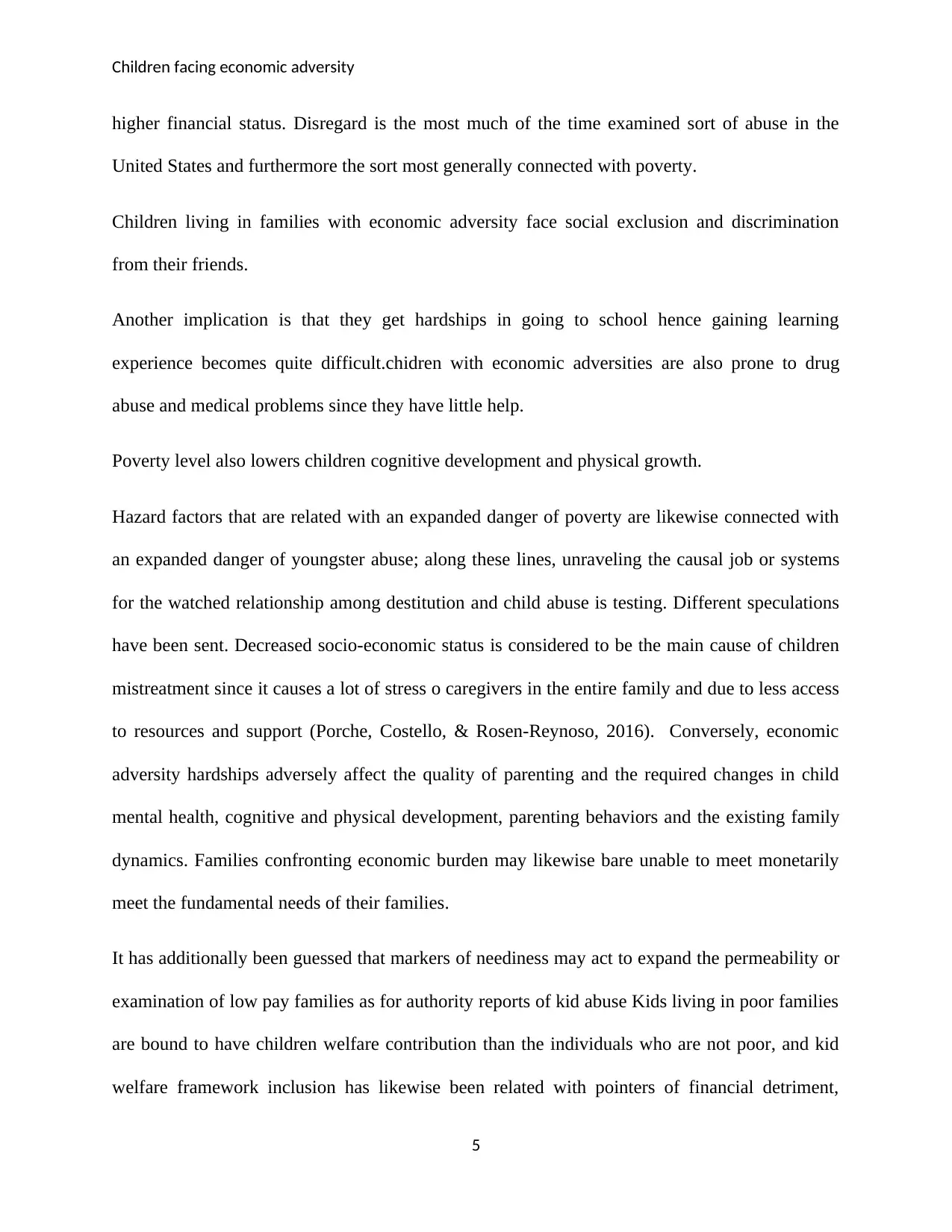
Children facing economic adversity
higher financial status. Disregard is the most much of the time examined sort of abuse in the
United States and furthermore the sort most generally connected with poverty.
Children living in families with economic adversity face social exclusion and discrimination
from their friends.
Another implication is that they get hardships in going to school hence gaining learning
experience becomes quite difficult.chidren with economic adversities are also prone to drug
abuse and medical problems since they have little help.
Poverty level also lowers children cognitive development and physical growth.
Hazard factors that are related with an expanded danger of poverty are likewise connected with
an expanded danger of youngster abuse; along these lines, unraveling the causal job or systems
for the watched relationship among destitution and child abuse is testing. Different speculations
have been sent. Decreased socio-economic status is considered to be the main cause of children
mistreatment since it causes a lot of stress o caregivers in the entire family and due to less access
to resources and support (Porche, Costello, & Rosen-Reynoso, 2016). Conversely, economic
adversity hardships adversely affect the quality of parenting and the required changes in child
mental health, cognitive and physical development, parenting behaviors and the existing family
dynamics. Families confronting economic burden may likewise bare unable to meet monetarily
meet the fundamental needs of their families.
It has additionally been guessed that markers of neediness may act to expand the permeability or
examination of low pay families as for authority reports of kid abuse Kids living in poor families
are bound to have children welfare contribution than the individuals who are not poor, and kid
welfare framework inclusion has likewise been related with pointers of financial detriment,
5
higher financial status. Disregard is the most much of the time examined sort of abuse in the
United States and furthermore the sort most generally connected with poverty.
Children living in families with economic adversity face social exclusion and discrimination
from their friends.
Another implication is that they get hardships in going to school hence gaining learning
experience becomes quite difficult.chidren with economic adversities are also prone to drug
abuse and medical problems since they have little help.
Poverty level also lowers children cognitive development and physical growth.
Hazard factors that are related with an expanded danger of poverty are likewise connected with
an expanded danger of youngster abuse; along these lines, unraveling the causal job or systems
for the watched relationship among destitution and child abuse is testing. Different speculations
have been sent. Decreased socio-economic status is considered to be the main cause of children
mistreatment since it causes a lot of stress o caregivers in the entire family and due to less access
to resources and support (Porche, Costello, & Rosen-Reynoso, 2016). Conversely, economic
adversity hardships adversely affect the quality of parenting and the required changes in child
mental health, cognitive and physical development, parenting behaviors and the existing family
dynamics. Families confronting economic burden may likewise bare unable to meet monetarily
meet the fundamental needs of their families.
It has additionally been guessed that markers of neediness may act to expand the permeability or
examination of low pay families as for authority reports of kid abuse Kids living in poor families
are bound to have children welfare contribution than the individuals who are not poor, and kid
welfare framework inclusion has likewise been related with pointers of financial detriment,
5
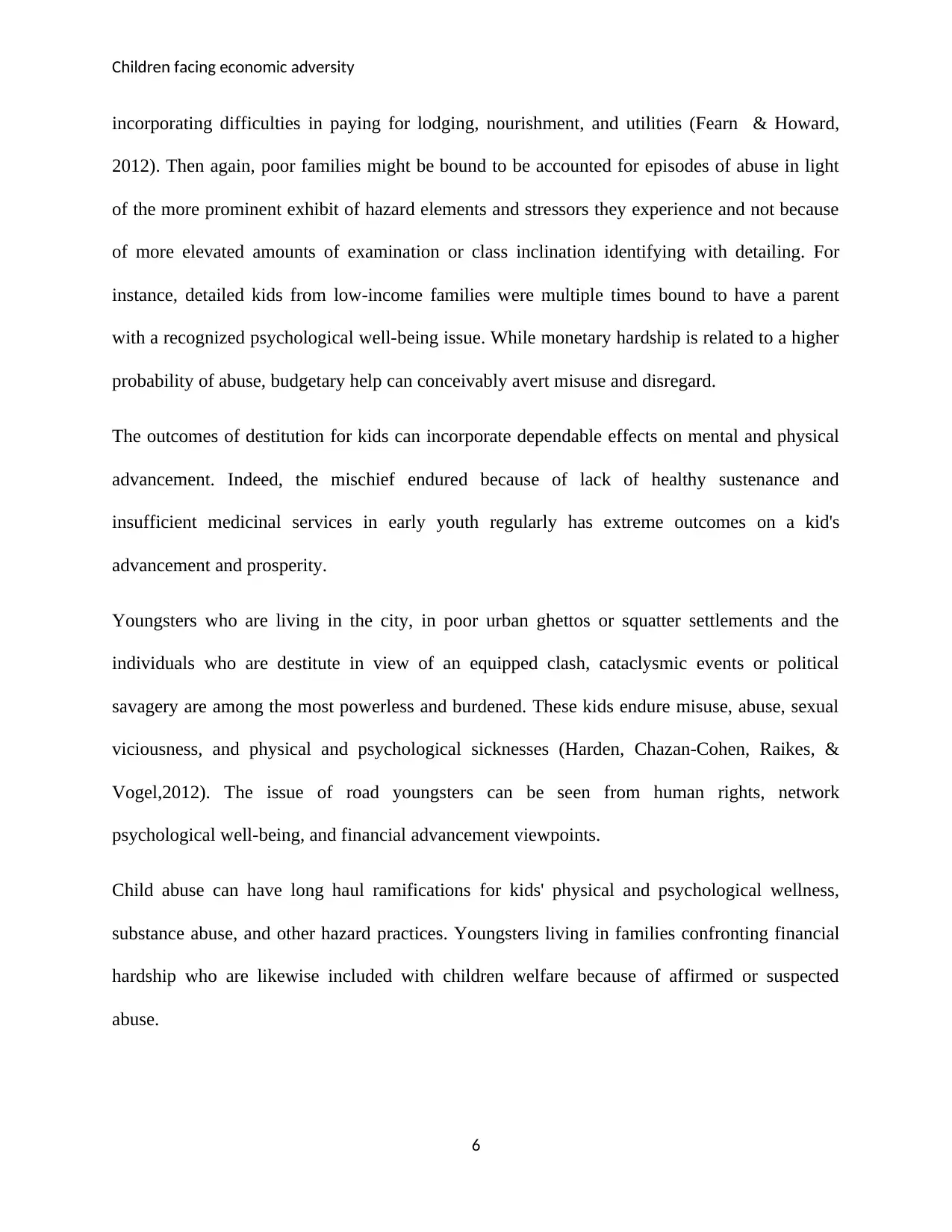
Children facing economic adversity
incorporating difficulties in paying for lodging, nourishment, and utilities (Fearn & Howard,
2012). Then again, poor families might be bound to be accounted for episodes of abuse in light
of the more prominent exhibit of hazard elements and stressors they experience and not because
of more elevated amounts of examination or class inclination identifying with detailing. For
instance, detailed kids from low-income families were multiple times bound to have a parent
with a recognized psychological well-being issue. While monetary hardship is related to a higher
probability of abuse, budgetary help can conceivably avert misuse and disregard.
The outcomes of destitution for kids can incorporate dependable effects on mental and physical
advancement. Indeed, the mischief endured because of lack of healthy sustenance and
insufficient medicinal services in early youth regularly has extreme outcomes on a kid's
advancement and prosperity.
Youngsters who are living in the city, in poor urban ghettos or squatter settlements and the
individuals who are destitute in view of an equipped clash, cataclysmic events or political
savagery are among the most powerless and burdened. These kids endure misuse, abuse, sexual
viciousness, and physical and psychological sicknesses (Harden, Chazan‐Cohen, Raikes, &
Vogel,2012). The issue of road youngsters can be seen from human rights, network
psychological well-being, and financial advancement viewpoints.
Child abuse can have long haul ramifications for kids' physical and psychological wellness,
substance abuse, and other hazard practices. Youngsters living in families confronting financial
hardship who are likewise included with children welfare because of affirmed or suspected
abuse.
6
incorporating difficulties in paying for lodging, nourishment, and utilities (Fearn & Howard,
2012). Then again, poor families might be bound to be accounted for episodes of abuse in light
of the more prominent exhibit of hazard elements and stressors they experience and not because
of more elevated amounts of examination or class inclination identifying with detailing. For
instance, detailed kids from low-income families were multiple times bound to have a parent
with a recognized psychological well-being issue. While monetary hardship is related to a higher
probability of abuse, budgetary help can conceivably avert misuse and disregard.
The outcomes of destitution for kids can incorporate dependable effects on mental and physical
advancement. Indeed, the mischief endured because of lack of healthy sustenance and
insufficient medicinal services in early youth regularly has extreme outcomes on a kid's
advancement and prosperity.
Youngsters who are living in the city, in poor urban ghettos or squatter settlements and the
individuals who are destitute in view of an equipped clash, cataclysmic events or political
savagery are among the most powerless and burdened. These kids endure misuse, abuse, sexual
viciousness, and physical and psychological sicknesses (Harden, Chazan‐Cohen, Raikes, &
Vogel,2012). The issue of road youngsters can be seen from human rights, network
psychological well-being, and financial advancement viewpoints.
Child abuse can have long haul ramifications for kids' physical and psychological wellness,
substance abuse, and other hazard practices. Youngsters living in families confronting financial
hardship who are likewise included with children welfare because of affirmed or suspected
abuse.
6
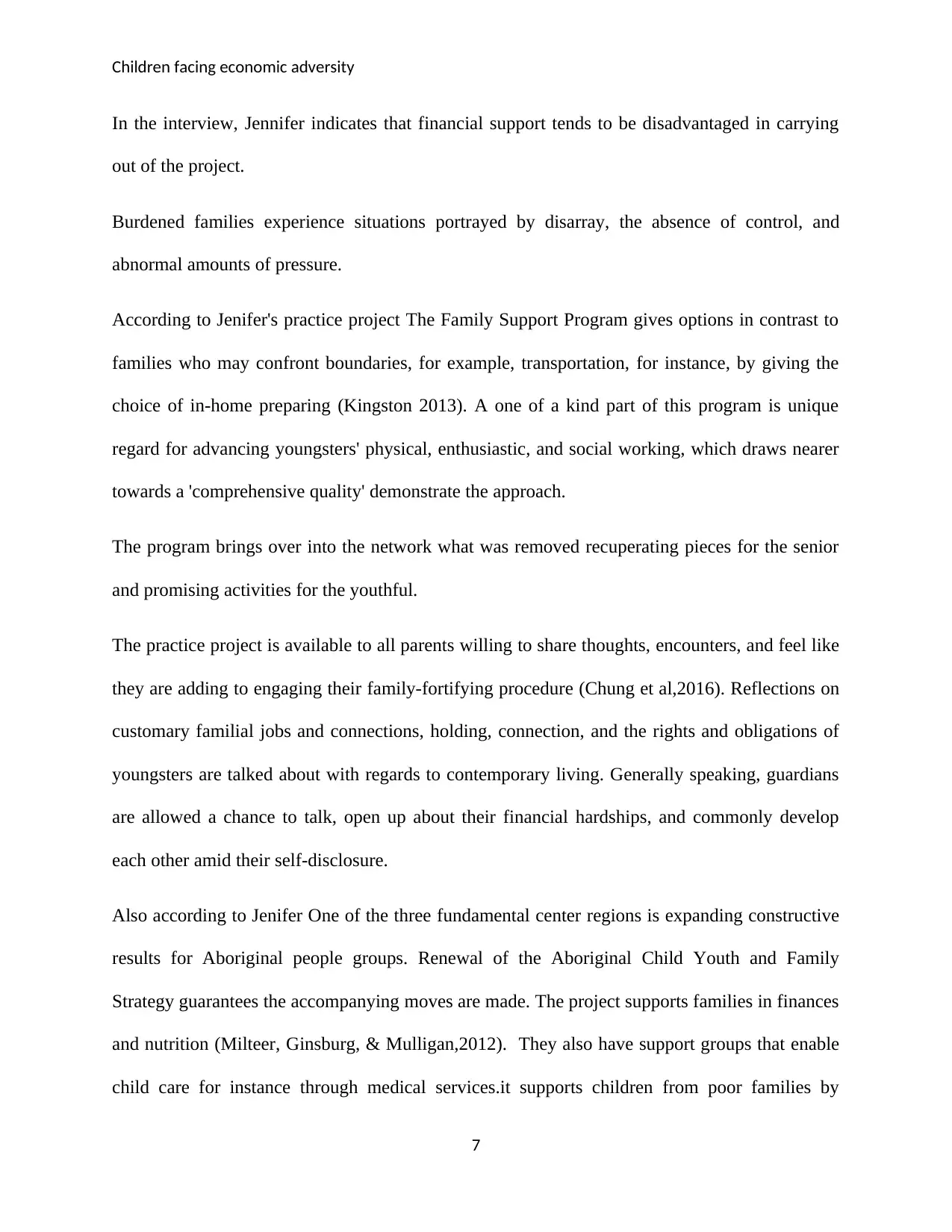
Children facing economic adversity
In the interview, Jennifer indicates that financial support tends to be disadvantaged in carrying
out of the project.
Burdened families experience situations portrayed by disarray, the absence of control, and
abnormal amounts of pressure.
According to Jenifer's practice project The Family Support Program gives options in contrast to
families who may confront boundaries, for example, transportation, for instance, by giving the
choice of in-home preparing (Kingston 2013). A one of a kind part of this program is unique
regard for advancing youngsters' physical, enthusiastic, and social working, which draws nearer
towards a 'comprehensive quality' demonstrate the approach.
The program brings over into the network what was removed recuperating pieces for the senior
and promising activities for the youthful.
The practice project is available to all parents willing to share thoughts, encounters, and feel like
they are adding to engaging their family-fortifying procedure (Chung et al,2016). Reflections on
customary familial jobs and connections, holding, connection, and the rights and obligations of
youngsters are talked about with regards to contemporary living. Generally speaking, guardians
are allowed a chance to talk, open up about their financial hardships, and commonly develop
each other amid their self-disclosure.
Also according to Jenifer One of the three fundamental center regions is expanding constructive
results for Aboriginal people groups. Renewal of the Aboriginal Child Youth and Family
Strategy guarantees the accompanying moves are made. The project supports families in finances
and nutrition (Milteer, Ginsburg, & Mulligan,2012). They also have support groups that enable
child care for instance through medical services.it supports children from poor families by
7
In the interview, Jennifer indicates that financial support tends to be disadvantaged in carrying
out of the project.
Burdened families experience situations portrayed by disarray, the absence of control, and
abnormal amounts of pressure.
According to Jenifer's practice project The Family Support Program gives options in contrast to
families who may confront boundaries, for example, transportation, for instance, by giving the
choice of in-home preparing (Kingston 2013). A one of a kind part of this program is unique
regard for advancing youngsters' physical, enthusiastic, and social working, which draws nearer
towards a 'comprehensive quality' demonstrate the approach.
The program brings over into the network what was removed recuperating pieces for the senior
and promising activities for the youthful.
The practice project is available to all parents willing to share thoughts, encounters, and feel like
they are adding to engaging their family-fortifying procedure (Chung et al,2016). Reflections on
customary familial jobs and connections, holding, connection, and the rights and obligations of
youngsters are talked about with regards to contemporary living. Generally speaking, guardians
are allowed a chance to talk, open up about their financial hardships, and commonly develop
each other amid their self-disclosure.
Also according to Jenifer One of the three fundamental center regions is expanding constructive
results for Aboriginal people groups. Renewal of the Aboriginal Child Youth and Family
Strategy guarantees the accompanying moves are made. The project supports families in finances
and nutrition (Milteer, Ginsburg, & Mulligan,2012). They also have support groups that enable
child care for instance through medical services.it supports children from poor families by
7
Paraphrase This Document
Need a fresh take? Get an instant paraphrase of this document with our AI Paraphraser
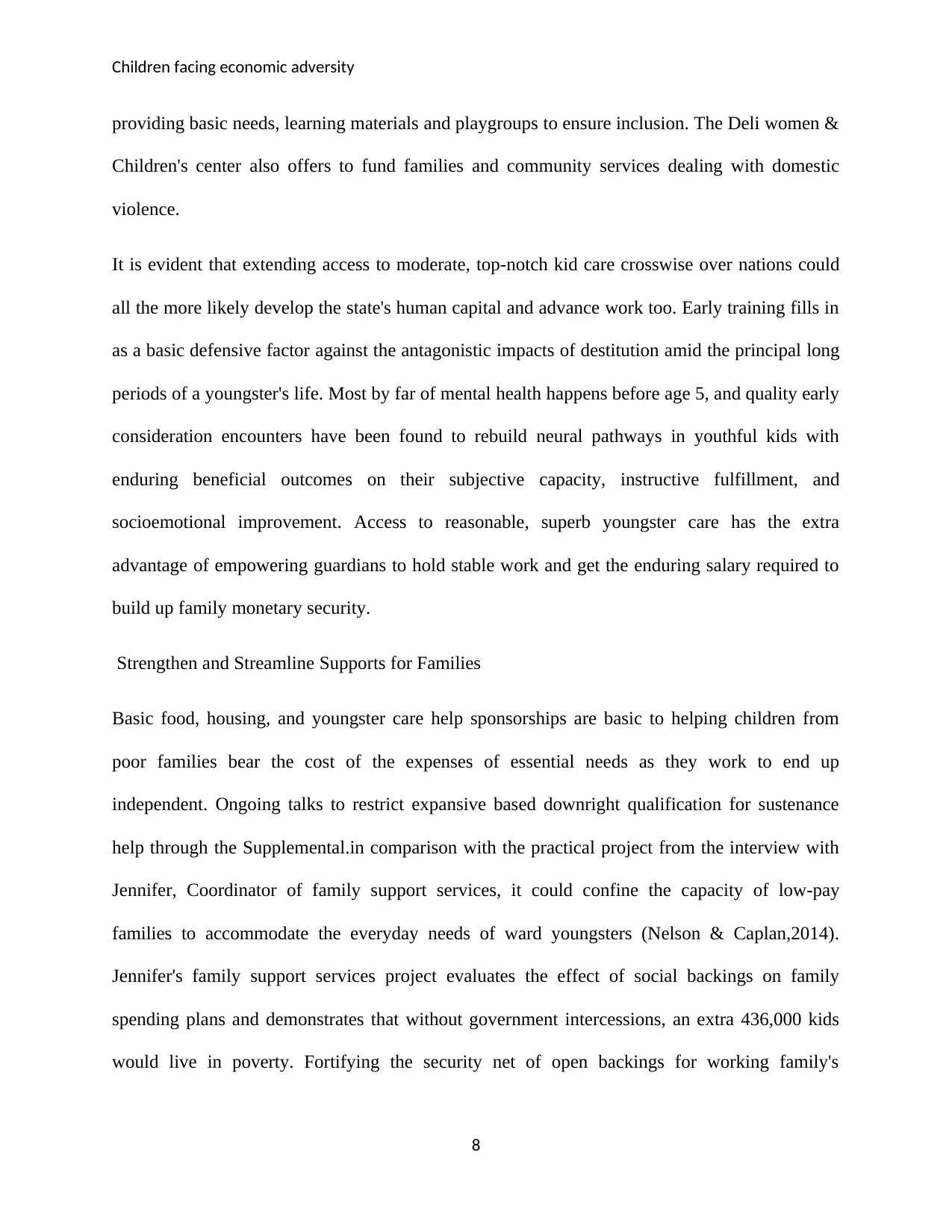
Children facing economic adversity
providing basic needs, learning materials and playgroups to ensure inclusion. The Deli women &
Children's center also offers to fund families and community services dealing with domestic
violence.
It is evident that extending access to moderate, top-notch kid care crosswise over nations could
all the more likely develop the state's human capital and advance work too. Early training fills in
as a basic defensive factor against the antagonistic impacts of destitution amid the principal long
periods of a youngster's life. Most by far of mental health happens before age 5, and quality early
consideration encounters have been found to rebuild neural pathways in youthful kids with
enduring beneficial outcomes on their subjective capacity, instructive fulfillment, and
socioemotional improvement. Access to reasonable, superb youngster care has the extra
advantage of empowering guardians to hold stable work and get the enduring salary required to
build up family monetary security.
Strengthen and Streamline Supports for Families
Basic food, housing, and youngster care help sponsorships are basic to helping children from
poor families bear the cost of the expenses of essential needs as they work to end up
independent. Ongoing talks to restrict expansive based downright qualification for sustenance
help through the Supplemental.in comparison with the practical project from the interview with
Jennifer, Coordinator of family support services, it could confine the capacity of low-pay
families to accommodate the everyday needs of ward youngsters (Nelson & Caplan,2014).
Jennifer's family support services project evaluates the effect of social backings on family
spending plans and demonstrates that without government intercessions, an extra 436,000 kids
would live in poverty. Fortifying the security net of open backings for working family's
8
providing basic needs, learning materials and playgroups to ensure inclusion. The Deli women &
Children's center also offers to fund families and community services dealing with domestic
violence.
It is evident that extending access to moderate, top-notch kid care crosswise over nations could
all the more likely develop the state's human capital and advance work too. Early training fills in
as a basic defensive factor against the antagonistic impacts of destitution amid the principal long
periods of a youngster's life. Most by far of mental health happens before age 5, and quality early
consideration encounters have been found to rebuild neural pathways in youthful kids with
enduring beneficial outcomes on their subjective capacity, instructive fulfillment, and
socioemotional improvement. Access to reasonable, superb youngster care has the extra
advantage of empowering guardians to hold stable work and get the enduring salary required to
build up family monetary security.
Strengthen and Streamline Supports for Families
Basic food, housing, and youngster care help sponsorships are basic to helping children from
poor families bear the cost of the expenses of essential needs as they work to end up
independent. Ongoing talks to restrict expansive based downright qualification for sustenance
help through the Supplemental.in comparison with the practical project from the interview with
Jennifer, Coordinator of family support services, it could confine the capacity of low-pay
families to accommodate the everyday needs of ward youngsters (Nelson & Caplan,2014).
Jennifer's family support services project evaluates the effect of social backings on family
spending plans and demonstrates that without government intercessions, an extra 436,000 kids
would live in poverty. Fortifying the security net of open backings for working family's
8
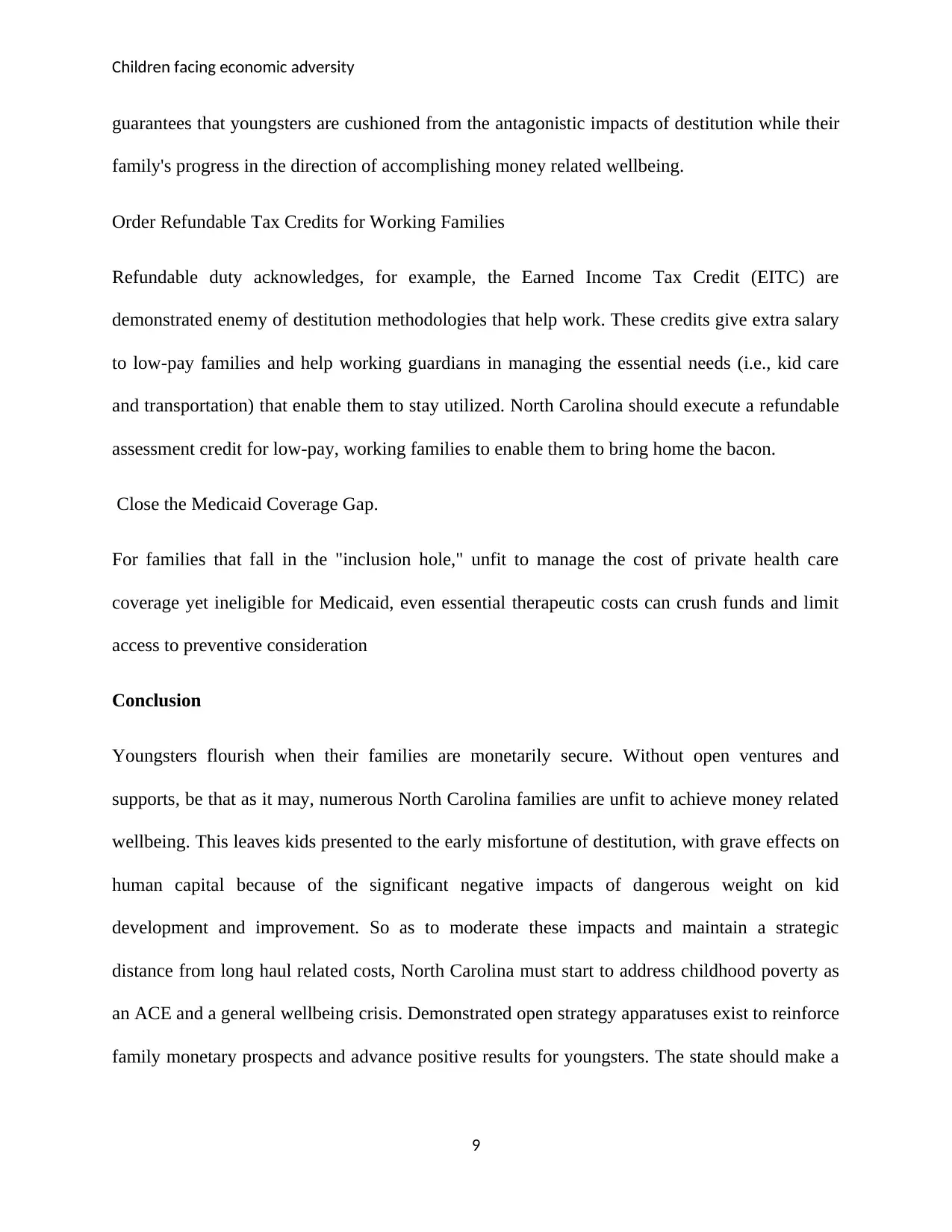
Children facing economic adversity
guarantees that youngsters are cushioned from the antagonistic impacts of destitution while their
family's progress in the direction of accomplishing money related wellbeing.
Order Refundable Tax Credits for Working Families
Refundable duty acknowledges, for example, the Earned Income Tax Credit (EITC) are
demonstrated enemy of destitution methodologies that help work. These credits give extra salary
to low-pay families and help working guardians in managing the essential needs (i.e., kid care
and transportation) that enable them to stay utilized. North Carolina should execute a refundable
assessment credit for low-pay, working families to enable them to bring home the bacon.
Close the Medicaid Coverage Gap.
For families that fall in the "inclusion hole," unfit to manage the cost of private health care
coverage yet ineligible for Medicaid, even essential therapeutic costs can crush funds and limit
access to preventive consideration
Conclusion
Youngsters flourish when their families are monetarily secure. Without open ventures and
supports, be that as it may, numerous North Carolina families are unfit to achieve money related
wellbeing. This leaves kids presented to the early misfortune of destitution, with grave effects on
human capital because of the significant negative impacts of dangerous weight on kid
development and improvement. So as to moderate these impacts and maintain a strategic
distance from long haul related costs, North Carolina must start to address childhood poverty as
an ACE and a general wellbeing crisis. Demonstrated open strategy apparatuses exist to reinforce
family monetary prospects and advance positive results for youngsters. The state should make a
9
guarantees that youngsters are cushioned from the antagonistic impacts of destitution while their
family's progress in the direction of accomplishing money related wellbeing.
Order Refundable Tax Credits for Working Families
Refundable duty acknowledges, for example, the Earned Income Tax Credit (EITC) are
demonstrated enemy of destitution methodologies that help work. These credits give extra salary
to low-pay families and help working guardians in managing the essential needs (i.e., kid care
and transportation) that enable them to stay utilized. North Carolina should execute a refundable
assessment credit for low-pay, working families to enable them to bring home the bacon.
Close the Medicaid Coverage Gap.
For families that fall in the "inclusion hole," unfit to manage the cost of private health care
coverage yet ineligible for Medicaid, even essential therapeutic costs can crush funds and limit
access to preventive consideration
Conclusion
Youngsters flourish when their families are monetarily secure. Without open ventures and
supports, be that as it may, numerous North Carolina families are unfit to achieve money related
wellbeing. This leaves kids presented to the early misfortune of destitution, with grave effects on
human capital because of the significant negative impacts of dangerous weight on kid
development and improvement. So as to moderate these impacts and maintain a strategic
distance from long haul related costs, North Carolina must start to address childhood poverty as
an ACE and a general wellbeing crisis. Demonstrated open strategy apparatuses exist to reinforce
family monetary prospects and advance positive results for youngsters. The state should make a
9
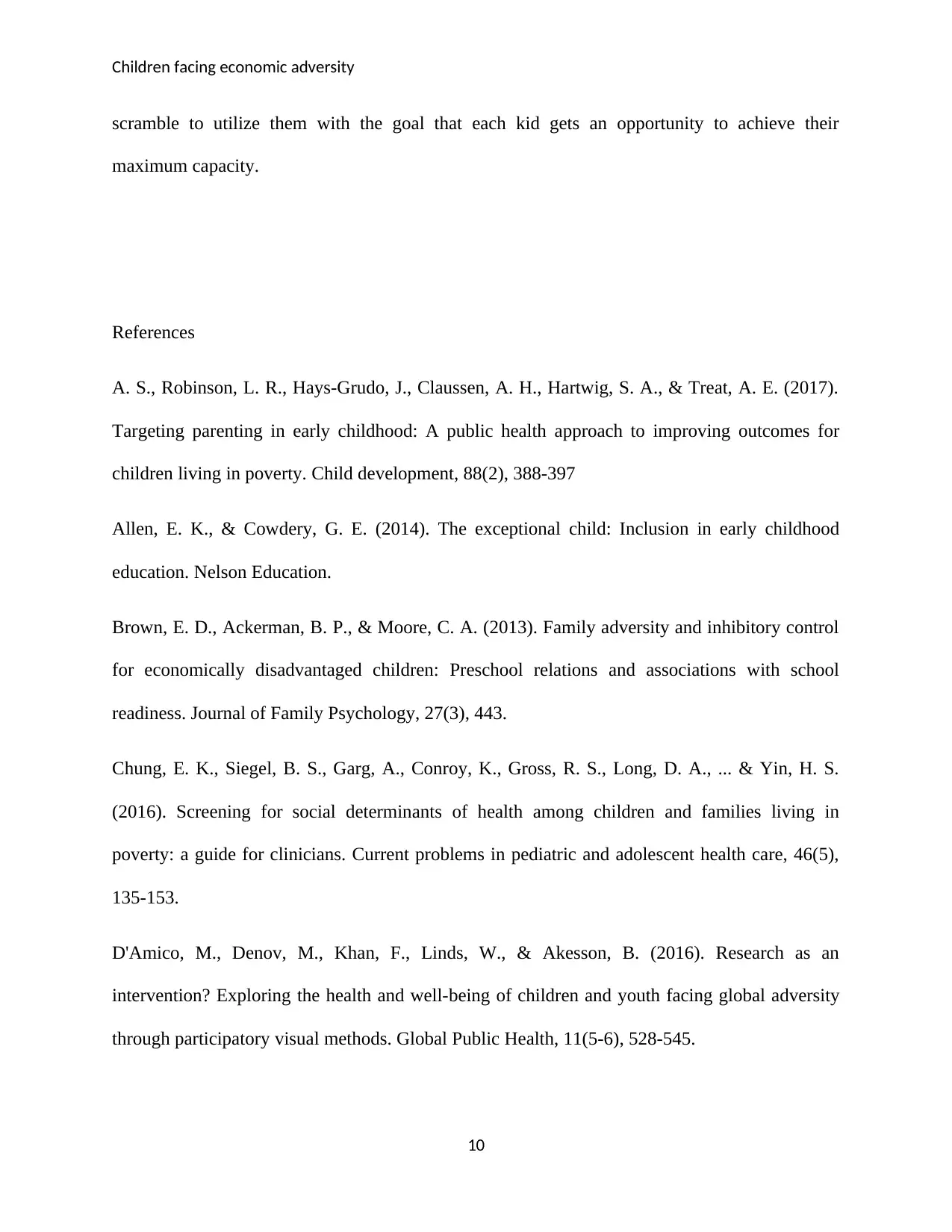
Children facing economic adversity
scramble to utilize them with the goal that each kid gets an opportunity to achieve their
maximum capacity.
References
A. S., Robinson, L. R., Hays‐Grudo, J., Claussen, A. H., Hartwig, S. A., & Treat, A. E. (2017).
Targeting parenting in early childhood: A public health approach to improving outcomes for
children living in poverty. Child development, 88(2), 388-397
Allen, E. K., & Cowdery, G. E. (2014). The exceptional child: Inclusion in early childhood
education. Nelson Education.
Brown, E. D., Ackerman, B. P., & Moore, C. A. (2013). Family adversity and inhibitory control
for economically disadvantaged children: Preschool relations and associations with school
readiness. Journal of Family Psychology, 27(3), 443.
Chung, E. K., Siegel, B. S., Garg, A., Conroy, K., Gross, R. S., Long, D. A., ... & Yin, H. S.
(2016). Screening for social determinants of health among children and families living in
poverty: a guide for clinicians. Current problems in pediatric and adolescent health care, 46(5),
135-153.
D'Amico, M., Denov, M., Khan, F., Linds, W., & Akesson, B. (2016). Research as an
intervention? Exploring the health and well-being of children and youth facing global adversity
through participatory visual methods. Global Public Health, 11(5-6), 528-545.
10
scramble to utilize them with the goal that each kid gets an opportunity to achieve their
maximum capacity.
References
A. S., Robinson, L. R., Hays‐Grudo, J., Claussen, A. H., Hartwig, S. A., & Treat, A. E. (2017).
Targeting parenting in early childhood: A public health approach to improving outcomes for
children living in poverty. Child development, 88(2), 388-397
Allen, E. K., & Cowdery, G. E. (2014). The exceptional child: Inclusion in early childhood
education. Nelson Education.
Brown, E. D., Ackerman, B. P., & Moore, C. A. (2013). Family adversity and inhibitory control
for economically disadvantaged children: Preschool relations and associations with school
readiness. Journal of Family Psychology, 27(3), 443.
Chung, E. K., Siegel, B. S., Garg, A., Conroy, K., Gross, R. S., Long, D. A., ... & Yin, H. S.
(2016). Screening for social determinants of health among children and families living in
poverty: a guide for clinicians. Current problems in pediatric and adolescent health care, 46(5),
135-153.
D'Amico, M., Denov, M., Khan, F., Linds, W., & Akesson, B. (2016). Research as an
intervention? Exploring the health and well-being of children and youth facing global adversity
through participatory visual methods. Global Public Health, 11(5-6), 528-545.
10
Secure Best Marks with AI Grader
Need help grading? Try our AI Grader for instant feedback on your assignments.
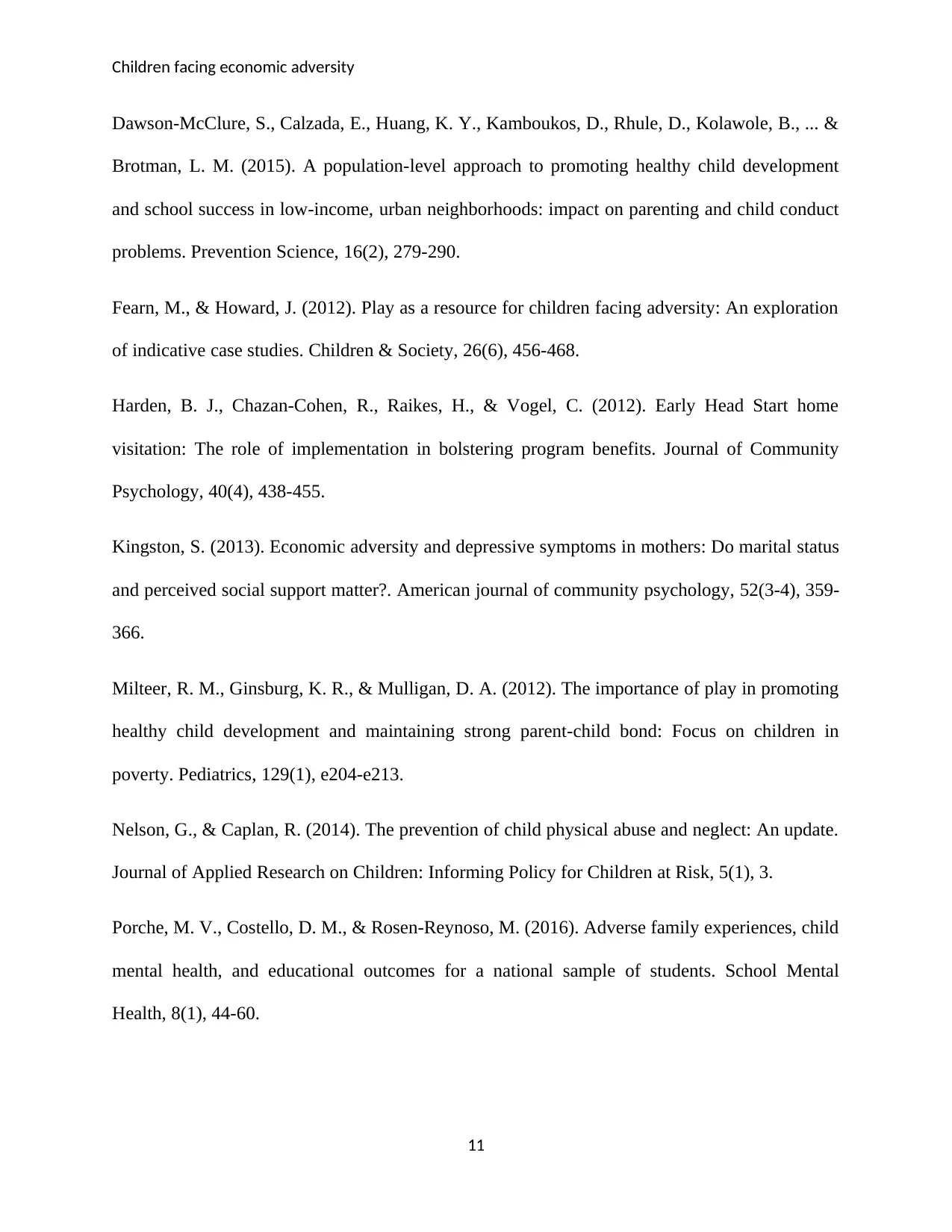
Children facing economic adversity
Dawson-McClure, S., Calzada, E., Huang, K. Y., Kamboukos, D., Rhule, D., Kolawole, B., ... &
Brotman, L. M. (2015). A population-level approach to promoting healthy child development
and school success in low-income, urban neighborhoods: impact on parenting and child conduct
problems. Prevention Science, 16(2), 279-290.
Fearn, M., & Howard, J. (2012). Play as a resource for children facing adversity: An exploration
of indicative case studies. Children & Society, 26(6), 456-468.
Harden, B. J., Chazan‐Cohen, R., Raikes, H., & Vogel, C. (2012). Early Head Start home
visitation: The role of implementation in bolstering program benefits. Journal of Community
Psychology, 40(4), 438-455.
Kingston, S. (2013). Economic adversity and depressive symptoms in mothers: Do marital status
and perceived social support matter?. American journal of community psychology, 52(3-4), 359-
366.
Milteer, R. M., Ginsburg, K. R., & Mulligan, D. A. (2012). The importance of play in promoting
healthy child development and maintaining strong parent-child bond: Focus on children in
poverty. Pediatrics, 129(1), e204-e213.
Nelson, G., & Caplan, R. (2014). The prevention of child physical abuse and neglect: An update.
Journal of Applied Research on Children: Informing Policy for Children at Risk, 5(1), 3.
Porche, M. V., Costello, D. M., & Rosen-Reynoso, M. (2016). Adverse family experiences, child
mental health, and educational outcomes for a national sample of students. School Mental
Health, 8(1), 44-60.
11
Dawson-McClure, S., Calzada, E., Huang, K. Y., Kamboukos, D., Rhule, D., Kolawole, B., ... &
Brotman, L. M. (2015). A population-level approach to promoting healthy child development
and school success in low-income, urban neighborhoods: impact on parenting and child conduct
problems. Prevention Science, 16(2), 279-290.
Fearn, M., & Howard, J. (2012). Play as a resource for children facing adversity: An exploration
of indicative case studies. Children & Society, 26(6), 456-468.
Harden, B. J., Chazan‐Cohen, R., Raikes, H., & Vogel, C. (2012). Early Head Start home
visitation: The role of implementation in bolstering program benefits. Journal of Community
Psychology, 40(4), 438-455.
Kingston, S. (2013). Economic adversity and depressive symptoms in mothers: Do marital status
and perceived social support matter?. American journal of community psychology, 52(3-4), 359-
366.
Milteer, R. M., Ginsburg, K. R., & Mulligan, D. A. (2012). The importance of play in promoting
healthy child development and maintaining strong parent-child bond: Focus on children in
poverty. Pediatrics, 129(1), e204-e213.
Nelson, G., & Caplan, R. (2014). The prevention of child physical abuse and neglect: An update.
Journal of Applied Research on Children: Informing Policy for Children at Risk, 5(1), 3.
Porche, M. V., Costello, D. M., & Rosen-Reynoso, M. (2016). Adverse family experiences, child
mental health, and educational outcomes for a national sample of students. School Mental
Health, 8(1), 44-60.
11
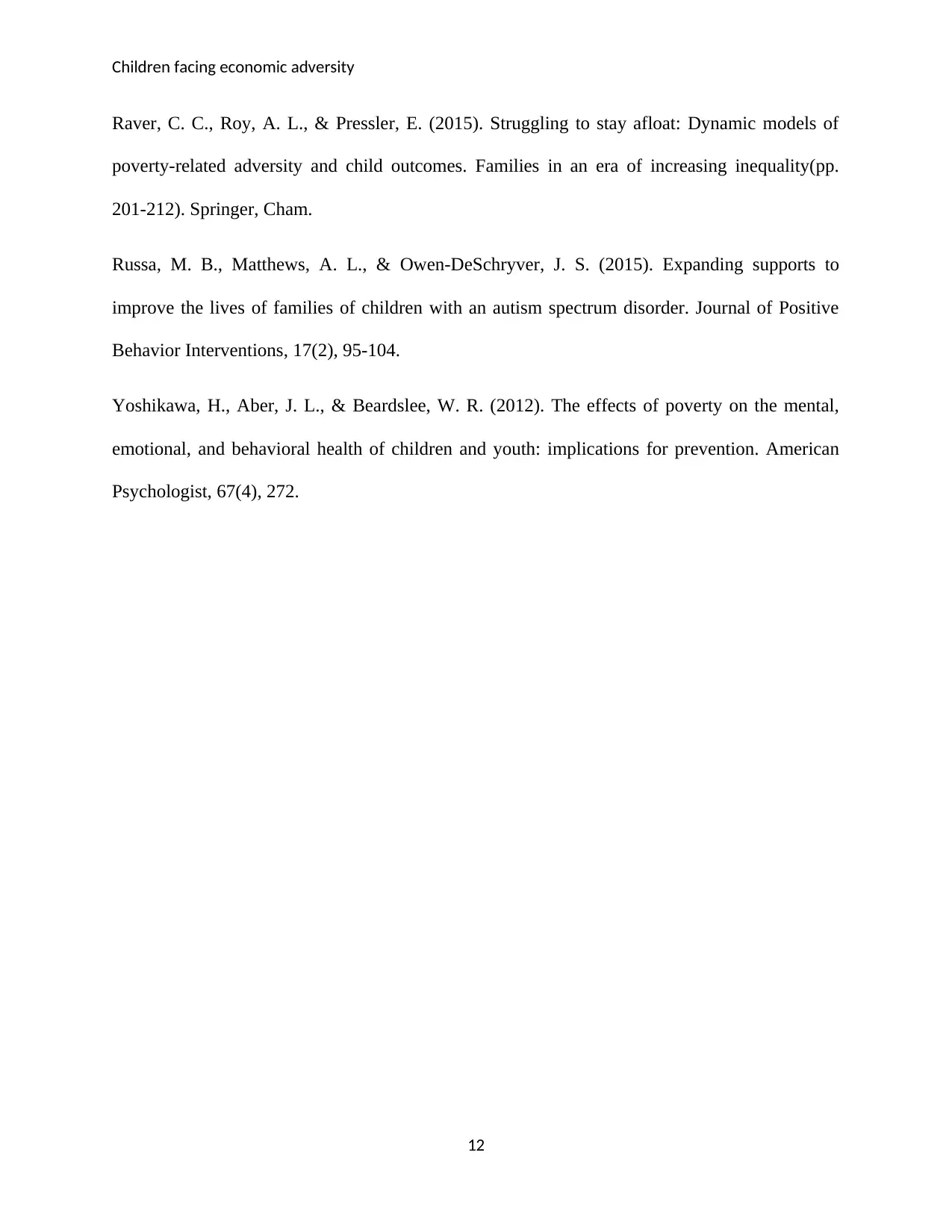
Children facing economic adversity
Raver, C. C., Roy, A. L., & Pressler, E. (2015). Struggling to stay afloat: Dynamic models of
poverty-related adversity and child outcomes. Families in an era of increasing inequality(pp.
201-212). Springer, Cham.
Russa, M. B., Matthews, A. L., & Owen-DeSchryver, J. S. (2015). Expanding supports to
improve the lives of families of children with an autism spectrum disorder. Journal of Positive
Behavior Interventions, 17(2), 95-104.
Yoshikawa, H., Aber, J. L., & Beardslee, W. R. (2012). The effects of poverty on the mental,
emotional, and behavioral health of children and youth: implications for prevention. American
Psychologist, 67(4), 272.
12
Raver, C. C., Roy, A. L., & Pressler, E. (2015). Struggling to stay afloat: Dynamic models of
poverty-related adversity and child outcomes. Families in an era of increasing inequality(pp.
201-212). Springer, Cham.
Russa, M. B., Matthews, A. L., & Owen-DeSchryver, J. S. (2015). Expanding supports to
improve the lives of families of children with an autism spectrum disorder. Journal of Positive
Behavior Interventions, 17(2), 95-104.
Yoshikawa, H., Aber, J. L., & Beardslee, W. R. (2012). The effects of poverty on the mental,
emotional, and behavioral health of children and youth: implications for prevention. American
Psychologist, 67(4), 272.
12
1 out of 12
Your All-in-One AI-Powered Toolkit for Academic Success.
+13062052269
info@desklib.com
Available 24*7 on WhatsApp / Email
![[object Object]](/_next/static/media/star-bottom.7253800d.svg)
Unlock your academic potential
© 2024 | Zucol Services PVT LTD | All rights reserved.